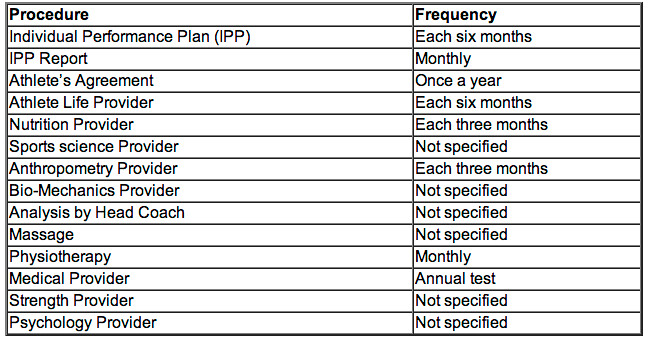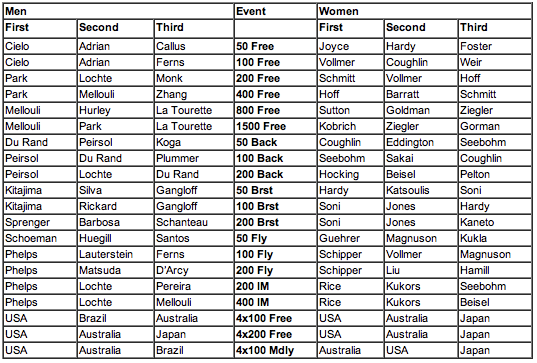By David
It’s not an easy read. Twice I’ve read it. Once quickly and, realising the shortcomings in my understanding, a second time slowly. I’m still not sure I appreciate all that it has to say. The problem is, it’s not well written. Poor punctuation, contradictory facts, bad grammar and a really impressive use of jargon make comprehension difficult. Here are examples of what I mean.
The “Athlete Life Plan” tells me “Currently 17 out of the 31 carded athletes are based at MISH”. The “Service Plan” however claims, “Of the 27 carded swimmers 18 are based at MISH. .” Besides the puzzling use of two full stops, I do hope Swimming New Zealand knows how many swimmers it has in the program and where they live. The huge number of reports athletes are required to provide seems a little pointless if there is some doubt about how many swimmers should be sending them in.
The report has dozens of sentences that could be used in high school texts as examples of the very best in self important jargon. Try these two examples. “Lead providers will create, communicate and advocate best practice in each area required” or “All planned services must be specifically aligned towards achieving performance oriented goals.” Very few of us have the legal training necessary to understand this gobbledygook. Some would say such doublespeak is simply a matter of overwhelming the swimming audience with technical and unfamiliar words. Or is it deliberate confusion to benefit the authors.
Early in the report we are told “Swimmers and Coach to meet with Head Coach Mark Regan to outline IPP by one month following the given dates (April and October).” Later in the report we are instructed to “Provide a proposed IPP (individual performance plan) to the SNZ GMPP within one month of selection All forms provided must be returned by due date.” This time there is no full stop after “selection”. Perhaps that’s where the additional full stop earlier in the report came from. The important point though is that one instruction requires us to meet with Head Coach Regan a month after April or October and the other requires us to send an IPP report to Jan Cameron within a month of selection. Is it a meeting or NZ Post? Is it Regan or Cameron? In most circles that would be called confusing.
The report doesn’t seem to know what to call Jan Cameron. She’s referred to as the General Manager of Performance Pathways (GMPP), the SNZ General Manager of Performance and Pathways, the General Manager (GM) and in one instance Swimming New Zealand General Manager (SNZ GM). One can only hope the last two are not Freudian views of the sport’s future. As Freud himself put it, perhaps we are “justified in inferring from them the presence of restrained or repressed intentions and intentions.” (Freud, An Autobiographical Study (1925))
The next example still has me confused. Here is what it says, “The level and amount of carding support available by NZAS PROVIDERS will be commensurate with the swimmers performance and their world ranking using the qualifying standard 800 FINA points for 2008 for 2011 and 2010 for 1012.” “Swimmers performance” needs an apostrophe. I’m not sure why “providers” needs to be in capitals and being as 1012 is only noted as the year of the Martyrdom of Alphege in Greenwich, London, I assume 1012 should be 2012.
There are a dozen other examples of these errors. I would be concerned if the resulting confusion was deliberate. Certainly the report is vague on any specifics that could hold the authors accountable for their performance. For example the organization’s target for this year’s Commonwealth Games is defined as “Podium finishes at commonwealth Games” Note the missed capital in Commonwealth but more importantly no quantification of how many podium finishes the managers and coaches who run elite swimming in New Zealand are responsible for winning; certainly no mention of gold medals. Two medals of any sort and by this definition the bosses of elite swimming in New Zealand can and probably will call themselves successful. In the case of the 2011 World Championships and the 2012 London Olympics the authors do set themselves the most minimal of targets; a medal of any type. Why are Cameron and Regan so reluctant to say, “We’re going to win a race”? With swimmers like Ingram, Palmer and Hind in their midst what’s the matter with setting out to win the bloody thing? The talent of those swimmers deserves no less. To the new and casual observer this plan looks like everybody is accountable for everything they do except the authors. For them this plan is just a good old fashioned escape clause.
Certainly the athletes covered by this report are accountable. I was recently responsible for coaching a swimmer who was on the United States national team. She didn’t have to complete anything like the number of reports and tests required in New Zealand. She had won an Olympic gold medal though. In the table below I have attempted to simplify the bureaucratic procedures New Zealand’s 27 (or is it 31) carded swimmers must observe.

All this analysis and reporting makes me wonder how Kenyan runners ever win a race. None of them have all this stuff. Quite a few don’t even own a pair of running shoes until pretty late in their careers. They sure can run fast though. Why is that? Come to think of it, I do know how they do it – they run a lot.
On the other hand I have some sympathy for our guys. After all this reporting, analysis, examination and investigation, if they have the time and can dredge up the energy; they can pop into the pool for a short swim.


